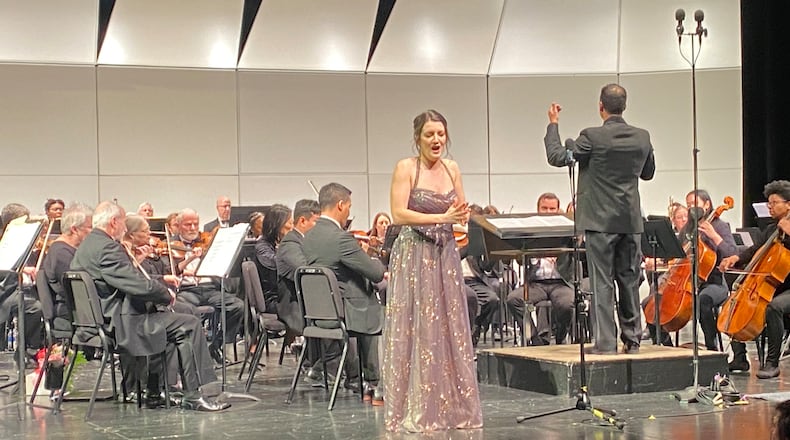This story was originally published by ArtsATL.
The Dekalb Symphony Orchestra took their usual stage at the Marvin Cole Auditorium at Dekalb Perimeter College Tuesday evening, Feb. 14, for a Valentine’s Day themed concert. With guest soprano Bethany Mamola, it proved to be more thematically rich and artistically impactful than what they’ve previously achieved.
The concert was a pleasant surprise from a conceptual standpoint as the orchestra dug deep into the concept of “love finding,” as musical director and conductor Paul Bhasin noted in his post-intermission remarks, that love is more than romantic adoration: it can also refer to deep strains of longing and hopeful anticipation. That set the stage for the orchestra to explore a world of subtle emotional layers that strove to articulate the feelings that lie beyond what mere speech can convey.
Credit: Stephen Salpukas
Credit: Stephen Salpukas
A jubilant rendition of Hector Berlioz’ “Rákóczi March” started the concert. It is a rousing processional derived from a theme that served as one of Hungary’s unofficial anthems before “Himnusz,” the combined work of poet Ferenc Kölcsey and composer Fenrec Erkel, became the country’s anthem of choice in 1844. In keeping with the evening’s secondary theme of musical pieces that have evolved when passed from one composer to the next, the “Rákóczi March” surfaces in Berlioz’ work as part of his “La damnation de Faust.”
In that context the piece is gloriously grandiose and full of a lighthearted sense of joy that the symphony carried off well with a performance that saw the sections trading melodic statements back and forth with ease. In the past, there have been moments where one section seemed to overplay or otherwise feel out of step with the ensemble as a whole. It was heartening to hear a well balanced orchestra that felt confident in its capacity and internally comfortable. Paul Bhasin has clearly hit his stride and whipped this plucky community orchestra into shape.
It was the guest appearance of soprano Bethany Mamola for a trio of works that was the evening’s majestic high point. From the opening strains of George Frideric Handel’s “Piangerò la sorte mia” from “Giulio Cesare” it was clear that this was that rare talent who commands not only the virtuosity of a seasoned operatic vocalist but also the stage presence and acting prowess necessary to truly embody the character she presents.
Where many singers lean entirely on showcasing the harrowing range of their pipes, Mamola instead adopts a patient, understated demeanor. She isn’t in a rush to impress and leans into the gentle, almost conversational aspect of her voice in a manner that draws the listener into a disarmingly intimate headspace. That daring approach gives the vocal performance room to develop throughout the piece at hand and listeners are shown a whole musical world contained in a single human voice.
Throughout her remaining pieces — “Si mi chiamano Mimi” from Giacomo Puccini’s “La Boheme” and “Song to the Moon” from Antonin Dvořák’s “Rusalka” — Mamola was a captivating presence not only for her extraordinary dynamic range but the graceful ease with which she commanded it. But through it all another factor emerged: her capacity to emote in character. The minute but significant movements — a flirtatious biting of the lip or a dismissive wave of the hand — were as integral to the performance as her captivating vocals. The result was a set of performances that carried the tonal impact of high opera and the subtle intimacy of a dramatic monologue.
The orchestra played an enjoyable second half with all four movements of Gabriel Fauré's “Pelléas et Mélisande Suite, Op. 80,” delving deep into those darker, more painful aspects of the vast, sprawling notion of “love.” The evening’s closer, Johannes Brahms “Variations on a Theme of Joseph Haydn, Op. 56a” seemed intended to restore the mood to the lightheartedness of the opening piece.
All of that was fine enough and spoke to the progress the Dekalb Symphony Orchestra has made since establishing Bhasin as their new director. But no amount of accomplishment could aspire to being more than a footnote to Bethany Mamola’s performance. Truly a name to watch in the Atlanta classical world.
::
Jordan Owen began writing about music professionally at the age of 16 in Oxford, Mississippi. A 2006 graduate of the Berklee College of Music, he is a professional guitarist, bandleader and composer. He is currently the lead guitarist for the jazz group Other Strangers, the power metal band Axis of Empires and the melodic death/thrash metal band Century Spawn.
Credit: ArtsATL
Credit: ArtsATL
MEET OUR PARTNER
ArtsATL (www.artsatl.org), is a nonprofit organization that plays a critical role in educating and informing audiences about metro Atlanta’s arts and culture. Founded in 2009, ArtsATL’s goal is to help build a sustainable arts community contributing to the economic and cultural health of the city.
If you have any questions about this partnership or others, please contact Senior Manager of Partnerships Nicole Williams at nicole.williams@ajc.com.
About the Author
Keep Reading
The Latest
Featured



